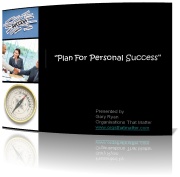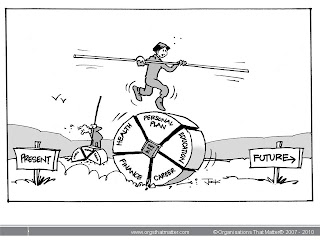Do you plan for personal success, or do you make half serious New Year resolutions, only to forget them three weeks into the New Year? This time of the year is always very interesting when speaking with people who have made New Year resolutions. Many have either not taken any action regarding their resolution, or have already started to ‘drop off’ their activity. Does this sound familiar to you?
There are a number of important reasons why New Year resolutions tend not to work.
1. Clarity of purpose for the resolution is missing
2. The timeframe for the resolution is too short
3. There is a disconnection between how a person’s resolution is to be achieved and its impact upon the rest of their life.
Let’s consider a typical New Year resolution. “This year I will get fit!” Gym owners love this resolution because it drives a lot of people through their doors. They sign up, pay their money, come along for the first couple of weeks and then…disappear! Yet they keep paying for their membership!
1. The clarity of purpose of the resolution is missing
My first career involved managing fitness centres so i used to see this example all the time. Getting fit is a terrific goal and I highly recommend and encourage people to become fitter. However, what happens when you ‘get fit’? What then? In other words, what is the purpose of getting fit in the first place? Many people respond to this question by saying, “To lose a few kilos”.
Losing a few kilos is a goal, not a purpose. A purpose is supported by goals. So instead of having a purpose to lose a few kilos, a different purpose may be to increase your health and capacity to be active so that you can physically do whatever you want, both now and into the future. For example, maybe you would really love to be able to go hiking, maybe even on an adventurous hike like the Kokoda Trail one day. Deep down you may really like to be able to achieve such a goal, but then you look in the mirror and say to yourself, “Oh, I can’t do that. I’m too unfit and old. It’s beyond me.” How sad! I mean it, statements like this are sad, they really are. Why live a life where there are things that you know that you really would like to achieve, but then not achieve them because of your current situation. So many people do this! They let their current situation stop them from doing what they really want to be doing. Clarify what you want, be honest about your current situation, but then create plans and take action to take you toward what you want. Personal planning for success helps to solve this problem.
Hiking the Kokoda Trail is a Big Goal. Big Goals, when supporting our purpose are fantastic because they usually involve long time frames. It took me two years of training before I ran my first marathon and, at the point in time when I made the decision to run my first one I had never run further than 10 kilometres. For 18 months, each time I went out to run a little voice in my head said, “What are you doing Gary? This is crazy. Your body hurts. Your muscles keep tearing. Your back hurts. You don’t even like running!”
Fortunately I had a greater purpose that kept driving me to go out each time. I wanted to be fit and healthy so that I could be a good example to my children and be able to play games with them. As you can see, having a purpose does not have to be rocket science! But having a purpose is powerful. It is so powerful that before I ran my first marathon, I had already booked in my next marathon. I didn’t want to stop what I was doing just because I had achieved my goal. Goals must support a purpose which therefore means that you must always have a goal that you are trying to achieve, but that goal will always be about ‘serving’ your higher purpose. Personally I have created a structure where I have to identify and book my next marathon no later than the day before the marathon that I am about to run. This ensures that I continue to have a goal to work towards that will enable me to live my purpose.
2. The timeframe for the resolution is too short
Often people don’t realise the real time frame for the achievement of their resolutions. If you haven’t been fit for a long time, getting fit is going to take three to six months. Immediate results will be noticed in the first few weeks of training but depending on your starting point, significant results can take quite a lot of time. When I used to manage fitness centre I used to encourage people not to train every day. Yes that’s right. I used to encourage people not to train! I had noticed people coming in wanting to get fit early in the New Year. They would be on holidays from work and would come every day. It was great. As soon as they went back to work, what do you think happened? They stopped coming in to the gym. All of a sudden they were too tired to come in before or after work everyday. This gym stuff simply had become too hard. But a lot of that had to do with their thinking. They hadn’t realised that they had been setting themselves up to fail by not structuring their training in the context of how they would be able to sustain it when they went back to work. Usually they weren’t clear about their purpose for training either which also made it easier to stop once a ‘roadblock’ got in their way. In this case the ‘roadblock’ was work..
3. There is a disconnection between how a person’s resolution is to be achieved and the rest of their life
The gym example above highlights this issue. Training five days a week when you are on holidays is great and achievable. Doing it when you have a very busy job plus family commitments suddenly becomes a lot more difficult. When creating New Year resolutions, many people forget to consider a range of strategies that could enable them to achieve their goal and support their purpose. There are many ways to get fit, to increase your health and to lose a few kilos. Another issue to consider is the goal in the first place. Maybe losing weight is an incorrect goal to have. Maybe establishing a healthy weight (as advised by a doctor) in the context of appropriate lean (muscle) body weight is more appropriate. Many people don’t realise that muscle weighs more (per kilogram) than fat. If you haven’t trained for some time it is possible that your lean body weight is lower than it should be. Exercise may increase your lean body weight, decrease your fat body weight, your measurements (where they matter!) might have significantly improved but you may have gained weight, or not lost very much.
When trying to achieve a healthy weight many people forget to consider how their health and fitness will affect the rest of their life. What are they going to stop doing to make time available to start doing what they should be doing? It could be as simple as “I’m going to stop watching television as much as I do, and I’m going to go to bed one hour earlier so that I can wake up one hour earlier to allow me to go for a walk/run/swim/ride/gym session”, or whatever it is that works for you.
The positive effects of increasing your health can be enormous. Sleep can be improved which then provides more energy for work, family, study etc. Being healthier results in people people having more energy that enhances clarity of thought and performance at work. Who wouldn’t want that? In Australia, increasing your health and fitness will also decrease your risk of heart disease, a condition that kills 128 Australian everyday! Very quickly living the purpose for becoming more healthy and fit can have a positive effect on all other aspects of your life!
Planning for personal success
So how do you ensure that your New Year resolutions are achieved? Planning for personal success is the solution. In its most simple form, planning for personal success requires the following seven elements.
1. Identifying what you want to achieve
What do you want to achieve? Don’t limit yourself to just this year, think of the things that you’d like to achieve at any stage in your life.
2. Understanding vision, strategy, goals and action
As I have outlined above, clarity of purpose is critical for personal success. Purpose is a part of vision which is not only about achieving what you want, but also includes how you behave while you are achieving what you want. Strategies are your high level plans about how you will move from your current reality toward your desired future, and your actions are the things that you actually have to do now in order to successfully achieve your strategies.
3. Identify your vision
This is more than just identifying what you want to achieve. It is about identifying how you want to live while you are travelling your journey toward your vision. It also involves understanding why you want what you want. Often the process of clarifying their vision results in people becoming clearer about what they really want, so much so that they change the achievements they identified in element 1 above. This is a positive aspect of personal planning for success.
4. Assess your current reality
Whenever we wish to go somewhere, we must always clarify our starting position. Being honest about our current reality in the context of our vision is critical if we are to have any chance of establishing effective strategies that will take us from where we are to where we want to be.
5. Develop strategies
Once the structure of your vision and current reality is established, it is amazing how you can begin to see what needs to be done to enable your current reality to move toward your desired future or vision.
6. Clarify your actions
Ultimately taking action is what brings your vision into reality. Strategies have to be broken down into clear time chunks so that your immediate and short term actions are clear. Once identified, place your actions into your calendar and commence doing them!
7. Review
The world is constantly changing. In addition, most people find that once they commence the personal planning journey, their clarity about their vision becomes more and more clear. Don’t be surprised if this happens to you. Reviewing your plan is critical to ensure that you really do create the future that you desire.
A new Planning for Personal Success email program to get you started
In the next few weeks Organisations That Matter will be launching a new seven week program for those of you who would like to complete an Introductory Personal Plan for Success. Each week you will receive an email which explains a key Personal Planning for Success Concept and then sets out a number of activities for you to complete. At the end of the program you will have developed your first Personal Plan for Success. If you are interested in this program and would like to learn more about the details and costs of the program, please express your interest to me via email at Gary.Ryan@orgsthatmatter.com .
Please feel free to ask questions and to comment on this article.
Gary Ryan enables individuals, teams and organisations to matter.
Visit Gary at http://garyryans.com



